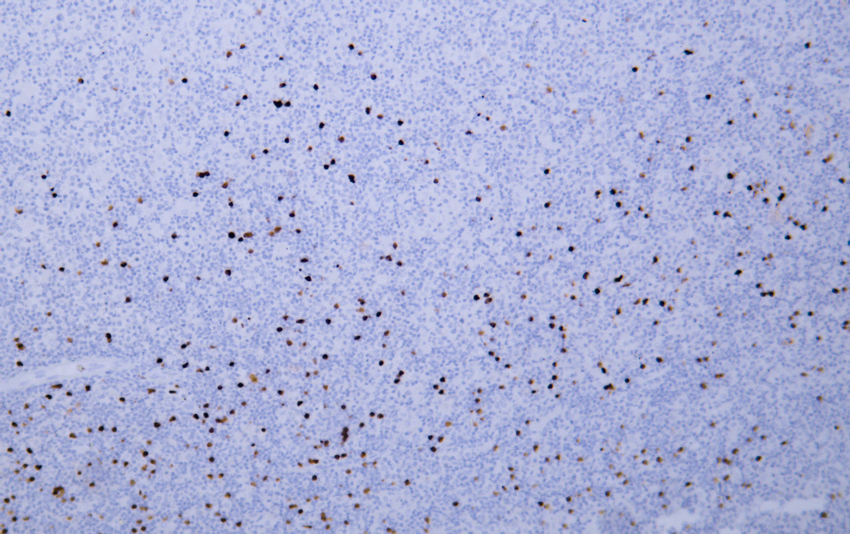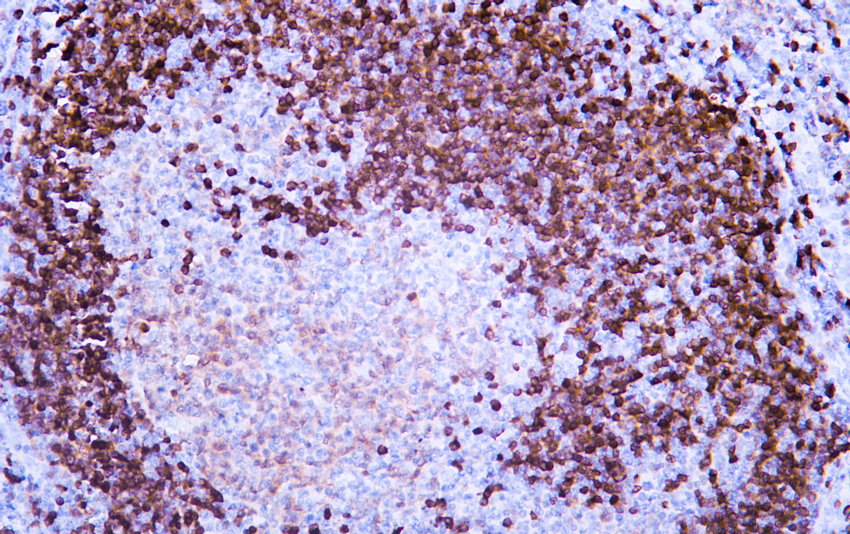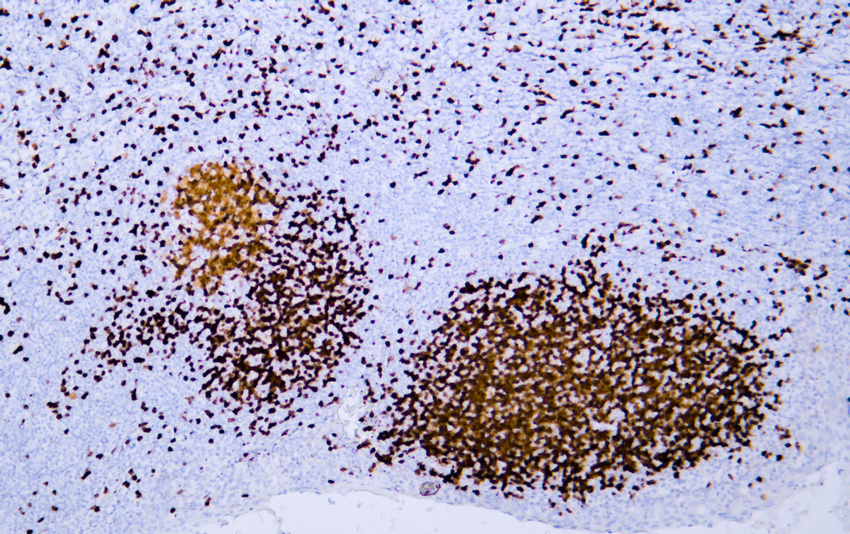TCL1 (ABT234) mouse mAb (Ready to Use)
- Catalog No.:YM6911R
- Applications:IHC
- Reactivity:Human;
- Target:
- TCL1
- Fields:
- >>PI3K-Akt signaling pathway
- Gene Name:
- TCL1A TCL1
- Protein Name:
- TCL1
- Human Gene Id:
- 8115
- Human Swiss Prot No:
- P56279
- Immunogen:
- Synthesized peptide derived from human TCL1 AA range: 50-114
- Specificity:
- The antibody can specifically recognize human TCL1 protein.
- Formulation:
- The prediluted ready-to-use antibody is diluted in phosphate buffer saline containing stabilizing protein and 0.05% Proclin 300
- Source:
- Mouse, Monoclonal/IgG2a, kappa
- Dilution:
- Ready to use for IHC
- Purification:
- The antibody was affinity-purified from ascites by affinity-chromatography using specific immunogen.
- Storage Stability:
- 2°C to 8°C/1 year
- Other Name:
- T-cell leukemia/lymphoma protein 1A (Oncogene TCL-1;Oncogene TCL1;Protein p14 TCL1)
- Background:
- Overexpression of the TCL1 gene in humans has been implicated in the development of mature T cell leukemia, in which chromosomal rearrangements bring the TCL1 gene in close proximity to the T-cell antigen receptor (TCR)-alpha (MIM 186880) or TCR-beta (MIM 186930) regulatory elements (summarized by Virgilio et al., 1998 [PubMed 9520462]). In normal T cells TCL1 is expressed in CD4-/CD8- cells, but not in cells at later stages of differentiation. TCL1 functions as a coactivator of the cell survival kinase AKT (MIM 164730) (Laine et al., 2000 [PubMed 10983986]).[supplied by OMIM, Jul 2010],
- Function:
- disease:Chromosomal aberrations activating TCL1A are found in chronic T-cell leukemias (T-CLL). Translocation t(14;14)(q11;q32); translocation t(7;14)(q35;q32); inversion inv(14)(q11;q32) that involves the T-cell receptor alpha/delta locuses.,function:Enhances the phosphorylation and activation of AKT1, AKT2 and AKT3. Promotes nuclear translocation of AKT1. Enhances cell proliferation, stabilizes mitochondrial membrane potential and promotes cell survival.,similarity:Belongs to the TCL1 family.,subcellular location:Microsomal fraction.,subunit:Homodimer. Interacts with AKT1, AKT2 and AKT3 (via PH domain). Interacts with PNPT1; the interaction has no effect on PNPT1 exonuclease activity.,tissue specificity:Restricted in the T-cell lineage to immature thymocytes and activated peripheral lymphocytes. Preferentially expressed early in T- and B-lymphocyte differentiation.,
- Subcellular Location:
- Cytoplasmic, Nuclear
- Expression:
- Restricted in the T-cell lineage to immature thymocytes and activated peripheral lymphocytes. Preferentially expressed early in T- and B-lymphocyte differentiation.
- June 19-2018
- WESTERN IMMUNOBLOTTING PROTOCOL
- June 19-2018
- IMMUNOHISTOCHEMISTRY-PARAFFIN PROTOCOL
- June 19-2018
- IMMUNOFLUORESCENCE PROTOCOL
- September 08-2020
- FLOW-CYTOMEYRT-PROTOCOL
- May 20-2022
- Cell-Based ELISA│解您多样本WB检测之困扰
- July 13-2018
- CELL-BASED-ELISA-PROTOCOL-FOR-ACETYL-PROTEIN
- July 13-2018
- CELL-BASED-ELISA-PROTOCOL-FOR-PHOSPHO-PROTEIN
- July 13-2018
- Antibody-FAQs
- Products Images

- Human diffuse large B-cell lymphoma tissue was stained with Anti-TCL1 (ABT234) Antibody

- Human diffuse large B-cell lymphoma tissue was stained with Anti-TCL1 (ABT234) Antibody

- Human follicular lymphoma tissue was stained with Anti-TCL1 (ABT234) Antibody

- Human tonsil tissue was stained with Anti-TCL1 (ABT234) Antibody



